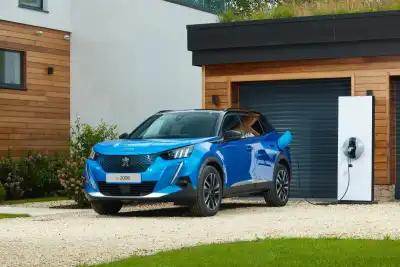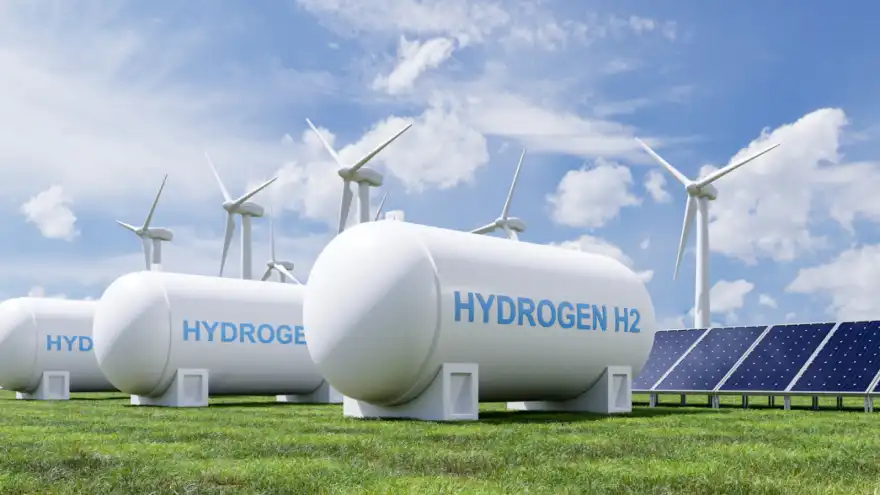
Hydrogen fuel cells are a cutting-edge technology that harnesses the power of hydrogen in an electrochemical process to generate electricity and water. This process, akin to the reverse of electrolysis, allows for the creation of 'green' hydrogen using renewable energy sources like wind, waves, and solar power. This green hydrogen is gaining traction as a clean energy source, emitting only water as a by-product.
While green hydrogen production remains a more costly option, accounting for just 5% of total hydrogen production, advancements in technology are steadily driving down costs. Currently, most hydrogen is produced from fossil fuels, but the shift towards renewable sources is underway and expected to accelerate with the maturation of renewable energy technologies.
Hydrogen's role in our energy future is crucial for creating a resilient, low-carbon energy system. It will help balance the intermittent nature of renewable energy sources by providing a stable energy supply for various applications including grid electricity, heating, and transportation.
Although debates persist regarding the advantages and disadvantages of hydrogen fuel cells, they remain an eco-friendly alternative to fossil fuels. With their ability to offer flexible and high-density power for industrial plants and various modes of transportation, hydrogen fuel cells represent a promising avenue for sustainable energy solutions.
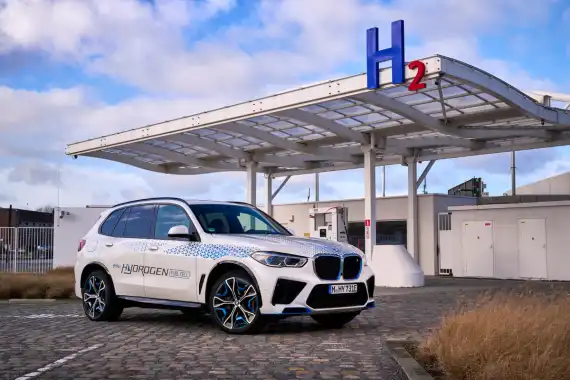
What are the advantages of hydrogen fuel cells?
1. Abundant and Sustainable
Hydrogen, is the universe's most abundant element, and although it can be tricky to extract from water, it's a super plentiful and renewable energy source. It's perfect for our future plans to cut carbon emissions, especially for things like heating and power.
2. Emission-Free
Hydrogen fuel cells only produce heat and water when they run and so have no harmful emissions as a by-product unlike traditional fossil fuels, contributing to cleaner air and reduced pollution.
3. Flexible Energy
Unlike biofuel or hydropower, making hydrogen doesn't need a lot of space. NASA even uses hydrogen to make drinking water for astronauts! This makes hydrogen fuel cells way safer and less harmful than coal, natural gas, or nuclear power, which can be risky to use.
Plus, using hydrogen helps balance the ups and downs of renewable energy, making it easier to use things like solar and wind power without needing big changes to our energy systems upfront.
4. Power Packed
Hydrogen fuel cells pack a lot of energy into a small space and use it efficiently. Pound for pound, hydrogen has more energy than any other common fuel. When it's pressurised into gas or liquid form, it's about three times more energy-dense than diesel or liquefied natural gas (LNG), and it's similar to natural gas in terms of energy packed into a given volume.
5. Efficiency Champions
Hydrogen fuel cells are super efficient compared to lots of other energy sources, even green ones. This means they can make more energy from the same amount of fuel. For instance, a regular power plant only turns about a third of its fuel into electricity, while hydrogen fuel cells can turn up to two-thirds of their fuel into energy. It's the same story with vehicles: hydrogen fuel cells use 40-60% of their fuel's energy, while also cutting fuel use by half compared to traditional engines.
6. Swift Charging
Hydrogen fuel cell vehicles charge up super fast, just like regular cars with internal combustion engines. Unlike electric vehicles, which can take anywhere from 30 minutes to several hours to charge, hydrogen fuel cell vehicles can be fully charged in less than five minutes. This quick charging means hydrogen-powered cars offer the same convenience as traditional cars.
7. No Noise Pollution
Hydrogen fuel cells are quiet, unlike some other renewable energy sources like wind turbines. This means that, similar to electric cars, hydrogen-powered vehicles run much more quietly than traditional cars with internal combustion engines.
8. Aesthetically Pleasing
Some eco-friendly energy sources, like wind turbines and biofuel power plants, can be unsightly. However, hydrogen fuel cells need less space, so they don't create as much visual pollution.
9. Long Usage Times
Hydrogen fuel cells are super efficient when it comes to usage times. A hydrogen car can travel as far as those using fossil fuels, around 300 miles. This is better than electric vehicles (EVs), which often need fuel cell power units to extend their range. Plus, hydrogen fuel cells work well in all temperatures and don't get worse in cold weather like EVs can.
10. Remote Area Solution
In places where it's possible, making and storing hydrogen locally could replace using diesel for power and heating in remote areas. This means less need to transport fuels and better lives for people in far-off places, since they'd be using a cleaner fuel that's easy to find.
11. Versatile Solutions
As hydrogen fuel cell technology gets better, it can be used for lots of different things, both big and small. We're already seeing hydrogen-powered vehicles, but it could also be used in things like home appliances and large heating systems. Unlike battery power, where the size of the battery determines how much power you get, with hydrogen fuel cells, you can separate the storage and engine size. This gives designers a lot of flexibility.
12. Democratisation of Power Supply
Hydrogen fuel cells could lessen a country's reliance on fossil fuels, which would spread energy resources more evenly across the globe. This independence would be a big help for countries that rely a lot on fossil fuels now. Plus, it would prevent issues like higher fossil fuel prices as supplies go down.
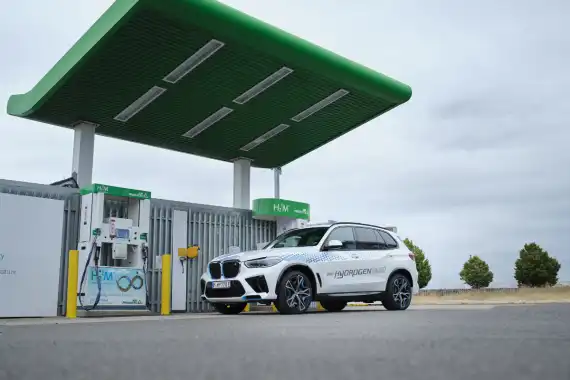
What are the challenges of hydrogen fuel cells?
Despite their many benefits, hydrogen fuel cells also come with some drawbacks:
1. Hydrogen Extraction:
Even though hydrogen is everywhere, it doesn't come as just pure hydrogen. We have to get it from water or fossil fuels, which takes a lot of energy. Sometimes, the energy needed is more than what we get from the hydrogen itself, and it can be costly. Plus, getting hydrogen often involves using fossil fuels, which isn't great for the environment unless we have carbon capture technology.
2. Need for Investment:
To make hydrogen fuel cells a real option for energy, they need a lot of investment in research and development. This means governments and companies have to put in time and money to make the technology better. Basically, the big challenge is figuring out how to build up the supply and demand for hydrogen energy in a way that makes sense financially.
3. Costly Materials:
Some expensive metals like platinum and iridium are often needed in fuel cells and certain types of water electrolysers. This makes the starting cost of fuel cells and electrolysers quite high, which has stopped some people from investing in hydrogen fuel cell technology. We need to find ways to lower these costs so that hydrogen fuel cells can be affordable for everyone.
4. Regulatory Hurdles:
Regulatory issues can be a barrier for commercial projects using hydrogen fuel cells. If there aren't clear rules about how these projects should work or how they'll make money, it's hard for companies to decide if they're worth investing in. This can make it tough for projects to get the funding they need to get started.
5. High Overall Cost:
Right now, it costs more to get power from hydrogen fuel cells compared to other energy sources, like solar panels. This might change as technology gets better, but for now, it's stopping hydrogen from being used a lot, even though it's more efficient once we have it. This higher cost also affects things like the price of hydrogen-powered vehicles, so not many people are using them yet.
6. Complex Storage:
Storing and moving hydrogen around is trickier than with fossil fuels, which adds extra costs.
7. Infrastructure Needs:
We've been using fossil fuels for a long time, so we already have the infrastructure in place to support them. But if we want to use hydrogen fuel cells for cars on a big scale, we'll need new places to refuel them. However, for longer trips, like those for big trucks, we might use a system where you can refill your tank from start to finish.
8. Safety Concerns:
Hydrogen is highly flammable, which raises safety worries. It needs to be handled carefully to avoid accidents.
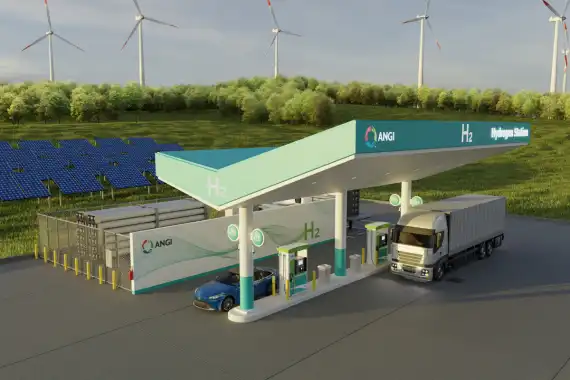
Summary
Hydrogen fuel cells offer great potential as a renewable energy source, but there are still hurdles to overcome before we can fully benefit from them in a decarbonised energy system.
On the bright side, hydrogen fuel cells could provide clean and renewable power for both stationary and mobile uses in the near future. To make this happen, we need to ramp up production of clean hydrogen and manufacturing of fuel cells. We also need clear regulations for how to use them commercially. Additionally, we're looking for ways to make the whole process cheaper, from getting the hydrogen to storing and moving it around. This means we'll need more investment in the infrastructure too.
Hydrogen could be the answer to our energy needs in the future, but getting there will take political commitment and money. However, as we use up fossil fuels, hydrogen could be a vital part of meeting our global energy demands.

